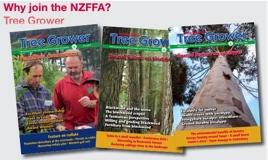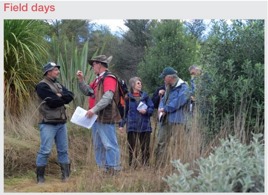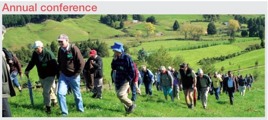Growing, processing and marketing smaller durable hardwood logs Australian style
Mark Wright, Jon Lambert and Harriet Palmer, New Zealand Tree Grower August 2020.
In the May 2020 edition of Tree Grower, we reported on the progress of the NZ Dryland Forests Initiative in developing short rotation regimes for selected durable eucalypt species. The anticipated markets include ground-durable posts and poles along with high-strength engineered wood products. In south-eastern Australia, two companies Super Forest Plantations and Heartwood Plantations, are also well down the track of developing growing regimes, products and markets for durable eucalypts. This article is a summary of their activities because we can learn a lot from them.
Australia currently imports a large proportion of its hardwood timbers worth around AU$2 billion a year. Remaining old-growth eucalypt forests are increasingly managed for conservation. Only an estimated 20 percent of Australia’s one million hectares of hardwood plantations are grown for logs and only a fraction of these are durable species.
Integrated sustainable plantation timber
Super Forest Plantations is a family business, based in northern New South Wales. The business involves three siblings, James, Mark and Wendy Wright. Together they own and manage 11 properties totalling 3,300 hectares of which 1,200 hectares are plantation forest.
Since it began in 1999 the company has been working towards an integrated, sustainable plantation timber log and cattle production business, with the environmental and social values of their properties always very much at the forefront. The company focuses on two enterprises – eucalypt timber and Brahmin-cross cattle. The cattle graze under the plantation trees, benefitting from shade and shelter. They reduce weed control requirements and fire risk as well as being a source of prime beef.

Planting and monitoring
Initially the timber planting was experimental, using a wide variety of local timber species planted on a range of sites and in different mixtures. The initial planting was closely monitored and the species which performed well and proved suitable for growing in plantations were identified for use in later planting.
Around 16 species have been tested and eight are now being grown in mixed species plantings for hardwood timber. These species are Eucalyptus cloeziana Gympie messmate, E. pilularis blackbutt, E. siderophloia grey ironbark, E. resinifera red mahogany, E. acmenoides white mahogany, E. propinqua grey gum, Corymbia citriodora sub. variegata spotted gum and Lophostemen confertus brush box.
All species are sub-tropical and indigenous to northeast New South Wales and south-east Queensland. All are also very durable, being Class 1 and 2 which means minimum of 25 and 15 years in-ground life, providing a good range of end uses and markets for the timber produced. Matching species to sites, along with suitable species mixtures, improves the productive potential of the plantations. New species continue to be tested and introduced as part of the mix if proved to be successful.
Initial stocking has been reduced from 1,250 to 800 stems a hectare. Row orientation has changed from along the contour to up and down the slope. First pruning and non-commercial thinning takes place at four years of age with all following thinning being commercial.
Techniques to grow low-light-tolerant grasses under the trees have been introduced. These changes have reduced establishment and silvicultural management costs, made machinery operation more efficient and safer, improved the safety and efficiency of harvesting operations and allowed for an increase in cattle stocking within the plantations.
Productivity increases
Tree improvement work is also being carried out, involving progeny trials of selected species grown across a range of sites. The growth is monitored and the best performing ones are grown together to produce improved seed with a broad genetic base. Increases in productivity of up to 60 per cent can be achieved by growing trees with reduced defects and straighter trees with fewer branches, faster growth along with better pest and disease resistance. The improved seed will be used in-house and available for sale to other timber plantation growers. The oldest trees planted from 2001 to 2004 have now been production-thinned and the wood used for small poles for houses and sheds, fencing and firewood.

Super Forest Plantations has bought and commissioned a spindle-less lathe rotary peeler You can see a photograph of this in the May 2020 Tree Grower. It is a new project and the company is in the early stages of research and development but with encouraging results. The aim is to produce naturally durable posts from the 15 years of age.
Until now trees of this size have had little to no commercial value. If the new venture is successful, the profitability of durable eucalypt plantations will be improved and provide an early return on investment from a formerly non-commercial thinning. Removing the non-durable sapwood with the lathe produces a straight peeled post which should last up to 15 years or more in the ground. It is significantly stronger than alternative treated pine products and has none of the toxic waste disposal problems of treated timber.
Milled timber, telegraph poles and split posts will be available from when the trees are 20 to 25 years old to the final harvest at 30 to 35 years. From 2022 there will be a continuous supply of quality, sustainably produced timber as the various staged plantings reach saw log size.
Managing forestry investments
Heartwood Plantations is another company doing well in terms of developing the potential for plantation durable eucalypts in south-eastern Australia. This company, established in 1995, has a different business model in that it mainly manages forestry investments. It is managed by founder Jon Lambert and is based in Gippsland, Victoria.
Here trees grow in high rainfall of 800 to 1200 mm a year in areas of the Strzelecki Ranges, and medium rainfall of 650 to 800 mm a year in zones along the coastal foothills. The company has established over 1,000 hectares of durable eucalypts across more than 40 properties as well as providing consultancy and operational services for other plantation owners.
The team manages everything from land purchase through tree establishment and management to harvesting and replanting. The focus is on growing high-quality Class 1 and 2 durable species mainly for external appearance timber. Four species indigenous to the area feature in new planting – E. botryoides southern mahogany, E. muelleriana yellow stringybark, Corymbia maculata spotted gum, and E. sieberi silvertop ash. In recent years, areas of coast grey box E. bosistoana and red ironbark E. tricarpa have also been established.
Heartwood Herds is a complimentary business running mainly Angus and Hereford cattle and Wiltshire Pool sheep to reduce fire risk, manage noxious weeds and invading vegetation. At the same time they provide meat from genuine agroforestry land management.
Heartwood Plantations has been gradually developing its own genetic tree stock for future plantations with a range of provenance trials now mature enough to enable the company to begin creating seed orchards. Plantations are thinned three times, with the two thinnings at around 8 to 12 years and 15 to 20 years, producing small logs for firewood, posts, poles and milling. The company has been producing its own durable fence posts for several years and has recently completed some post trials in local vineyards. In recent years a lot of effort has been invested in developing a thinning system which is viable for small plantation material.
Milling from smaller logs
A unique element of the business is a partnership with a sawmilling company which uses a radial sawing technique to maximise wood recovery from smaller logs. The aim is to create sustainable value with a strong emphasis on the environmental benefits of growing plantation eucalypts in Australia. The eventual target is to establish 2,000 hectares of durable hardwood forests.
Radial sawing is unusual, but anyone who has attempted to mill small eucalypts conventionally will know of the timber’s tendency to bend and split. Radial sawmilling reduces these problems by first cutting the log into wedges which release the tension, and then breaking the wedges down. The technique is proving successful in increasing the yield of high value products which can be sawn from young logs.



Radially sawn timber includes weatherboards, external shiplap, flooring, boards and battens, outdoor decking and screens, and internal lining. Markets have consistently seen high demand in Victoria with the limited supply of resource the greatest barrier to expansion.
Durable Eucalypt Growers Forum

From a chance meeting at a conference, the Durable Eucalypt Growers Forum was formed. Six organisations have now come together to share knowledge, research and development and discuss concerns resulting from growing durable eucalypt timber plantations.
Outside the large public funded state agencies, this small group, includes Heartwood Plantations and Radial Timber, Super Forest Plantations, Hurford Hardwood, Private Forestry Service Queensland, Ironwood and the Specialty Wood Products Research Partnership with New Zealand Dryland Forests Initiative. They are the only organisations working at medium to large scale to develop durable eucalyptus plantation resources for sawlog production.
The group meets every year in a different region for a two-day forum hosted by one of the member organisations. The third is planned for October 2020 and the fourth is scheduled to be held in New Zealand, hosted by the Specialty Wood Products Research Partnership.
Mark Wright leads the Tree Improvement Division of Super Forest Plantations. Jon Lambert is General Manager, Heartwood Plantations. Harriet Palmer is an independent forestry communications specialist.

 Farm Forestry New Zealand
Farm Forestry New Zealand

